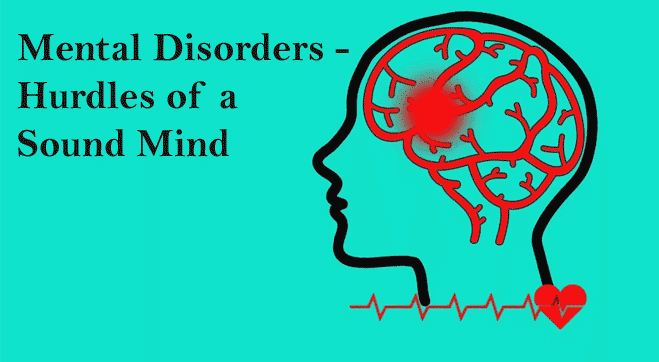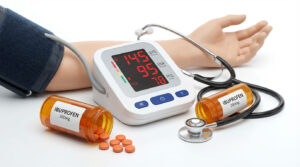An Unapparent, yet enduring pain Agonizingly more dramatic than physical strain Mental illness pictures as disgrace and dishonour For it is a taboo to the world Take a leap of faith confer with your kin So as to bid adieu to half of what ails.
Mental disorders comprise a broad range of problems, with various symptoms. They are generally characterized by some combinations of abnormal thoughts, emotions and behaviour. Individuals who have a mental illness don’t necessarily look like they are sick, especially if their illness is mild. But in severe cases, individuals may show visible symptoms such as confusion agitation or withdrawal. Like other diseases , mental disorders may become severe too and can cost ones life. Reports indicate that 50% of the population experiences at least one mental disorder in their lifetime and at least 25% of the population has suffered from it during the past 12 months. There are numerous mental disorders like stress related disorders, anxiety and mood disorders, schizophrenia and delusional disorders, substance misuse disorders, organic disorders, personality disorders, and eating disorders.
Determinants of Mental Health Various social, psychological and biological factors determine the mental health of a person at any point of time. Poor mental Health may also be associated with rapid social change, stressful working conditions, gender discrimination, social exclusion, unhealthy lifestyle , lack of physical health and violations of human rights.
Types of Mental Disorders
Stress Related Disorder Stress disorders are defined as a stressful or traumatic behaviour from which a person has difficulty in recovering. There can be various types of stress associated disorders.
Acute Stress Disorder Disorders which develop within one hour of a traumatic event are known as acute stress disorders. Their symptoms usually subside within an hour which include anxiety, anger, depression, altered activity and withdrawal. The symptoms usually resolve completely within few days.
Post Traumatic Stress Disorder It is a Chronic disorder that is experienced after a severe stress or a traumatic event such as a natural disaster. The symptoms include recurrent intrusive memories, disturbed sleep, nightmares and avoidance of situations that evoke memory
Adjustment Disorder It is caused due to a major psychosocial stress or life event such as divorce, job loss, loss of close ones, etc. Their symptoms appear within one month of the event and generally subside by six months.
Anxiety Disorder Anxiety disorder are those which produce a feeling of constant fear or worry. Its characteristic features are persistent, unrealistic and excessive worry about everything.
Obsessive Compulsive Disorder (OCD)- A Compulsion Beyond Control Intake of alcohol along with drug abuse, fear of insignificant events of life and depression can provoke a psychological problem called OCD. Those affected with OCD do not hold a firm grip on the kind and nature of thoughts that their mind generates. A forced feeling to repeatedly think about certain aspects of their life haunts them for atleast one hour per day. Along with this, a forced repetitive behavioral cycle is seen among them. Generally, the nature of thoughts that affect the patients of OCD are fear of contamination and fear of harming themselves. An exaggerated fear of dirt drives them to clean their hands, things or their homes repetitively.
Panic Disorder- A Common Ignored Problem- It is a type of anxiety disorder with a characteristic feature of repetitive and unexpected panic attacks. These attacks are defined as a period of intense fear in which four or more of the symptoms including palpitation, sweating, fear of dying, shivering, sensation of choking, nausea or chest pain develop suddenly and reach peak levels within 10 minutes.
Phobic Anxiety Disorder- Phobia can be defined as abnormal and
excessive fear of an object or a situation (such as fear of closed places). Phobias can be
categorized into the following types:
– Fear of animals
– Phobia of natural environment
(such as heights, depth, water)
– Blood or injury related phobia
(needles, wound)
– Fear of Situations (getting stuck in
lift)
– Other miscellaneous types
Mood Disorder It mainly involves those disorders that has an effect on the mood of an individual. There are various types of mood disorders such as depression, mania and bipolar disorder.
Depression- A Misunderstood Term-
It is a common, yet a serious mood disorder. It can have severe consequences that affect how one feels, thinks or handles daily activities, such as sleeping, eating or working. Its symptoms include persistent sad or anxious mood feeling of restlessness, guilt and worthless-ness, loss of interest in hobbies, decreased energy levels and thoughts of suicide.
Bipolar Disorder- The Maniacs – It includes both manic and depressive episodes separated by periods of normal mood. People who have manic attacks but, do not experience depressive episodes are also classified as having bipolar disorder. The usual symptoms are irritable mood, difficulty to speak, reduced sleep and hyper activity.
Schizophrenia Individuals with schizophrenia usually hear voices (auditory hallucinations), which often criticise them. The voices may directly communicate with the patient and comment on his/her actions. Also, the patient may hear the two voices criticizing the patient among themselves. This may lead to certain strong delusions or beliefs. It presents in early adulthood or late adolescence. The common symptoms are hallucinations, thought disorder, social withdrawal, self neglect and lack of motivation.
Delusional Disorder A delusion is a belief that is clearly false and that indicates an abnormality in the affected person’s content of thought. Individuals with this disorder feel and/or hear non existential things. They often hear noises which trouble them constantly as well as other illogical beliefs that may keep them confused. ? Substance Misuse Disorders These are caused due to excessive consumption of substance like drug and alcohol. Chronic intake of drugs can cause schizophrenia like symptoms, whilst excessive alcohol consumption can lead to improper speech, ataxia, emotional incontinence and aggression.
Organic Disorders These are medical conditions rather than psychiatric disorders. They are sometimes misdiagnosed as they present themselves with disturbed behavior like:
Dementia It is a condition characterized by progressive decline of cognitive function (memory, reasoning and associated functions). Symptoms of dementia are gradual and persistent for a long duration
Delirium- It is a confused state of mind, which usually develops in elderly and is characterised by lack of focus, altered consciousness and reduced reasoning ability. Conditions like dementia, poor hearing, low vision and older age act as risk factors for this condition.
Personality Disorders It is a set of characteristics and behavioural traits which can affect a person’s interaction with the outside world. It is diagnosed when an individuals personality cause severe problems for the person himself or others.
Eating Disorders These are disorders associated with abnormal eating behaviours. The common ones are anorexia nervosa,orthorexia nervosa and bulimia nervosa.
Orthorexia Nervosa- In this condition people are obsessed with proper nutrition. Such Individuals show characteristics such as restrictive diet, ritualized patterns of eating and strong avoidance of food that is believed to be unhealthy. Although, it is driven by a desire to achieve optimum health, orthorexia may lead to nutritional deficiencies
Anorexia nervosa It is the nature of having extreme consciousness about the size, shape and weight of the body. 80-90% of the patients with anorexia are females. People having this condition do over-exercise and overactivity to burn calories. They choose to stand rather than sit and generate opportunities to be physically active. Generally, they are drawn to sports, athletics and dance.
Bulimia Nervosa- Unlike anorexia, bulimia patients have near normal weight, but display a morbid fear of becoming fat; thereby, leading to disordered eating. They show features like binge eating (uncontrollable eating) often followed by selfinduced vomiting.
Better Understanding-A stepping stone to prevention
Prevention begins with being aware, to understand of the early warning signs and symptoms of mental illness, parents and teachers can encourage skill development in children and adolescents which may help them cope with everyday challenges that they may face in the outside world. Psychosocial support can as well be provided in schools or other community settings. Also, health workers and counselors can efficiently work towards detecting the condition aptly, thus creating a way to put the mental disorders in place,
Mood and Anxiety Disorders Overlooked Ones Stress, tension and fear that something would go wrong are, some emotional, uncomfortable conditions of life. These can very well give rise to other diseases , the most difficult one being a psychiatric disorder. A stressed person is not able to solve the problems he/she is entangled in, via a positive attitude. Living in this phase can make their life, disturbed and problematic which in turn gives rise to psychiatric disorders.
Stress-Initiator of Psychiatric Problems! Early life stress has been shown to exert profound short and long term effects on the physiology of the body. The bitter experiences are hard to erase from memories. Frequent stress in any phase of life has demonstrated clear association with many psychiatric disorders. The conditions that may arise in such a scenario are anxiety, mood disorders, depression, post traumatic stress disorder and bipolar disorder. They may occur along with depression alone, or in combination with mania. These disorders disturb the life of an individual tremendously.
Mood Disorders It is a mental illness that continuously affects the emotional state of the person. Depression, resulting from mood disorder may affect disabled, chronically ill as well as normal individuals Reports across the globe states it to be a major cause of disability and suicide.
Understanding Anxiety Disorders
Occasional anxiety is an expected part of life but a condition wherein an individual is affected by worry, fear or trauma and related condition repeatedly as well as inappropriately, is termed as anxiety disorder. Due to recurrent events of worry, frequency of these disorders get increased and converts to highly disturbing form of psychiatric disorders. For diagnosis, the psychiatrist usually asks if the person is a worrier or if they worry much about many things. This disorder is highly prevalent in children and teenagers with estimates of 11.6% prevalence in adolescents alone.”
Types of Anxiety Disorders There are several types of anxiety disorders, including generalized anxiety disorder, panic disorder and phobiarelated disorders. These disorders are mostly overlooked and are highly common, and potentially debilitating that are many a times not understood in the right sense.
Generalised Anxiety Disorder An individual is said to suffer from anxiety disorder when he or she is worried or anxious about any situation or circumstances in their life. Reason can vary from some discomfort in life to some trauma. The level of anxiety and worry is often high in the individuals suffering from this disorder.
Panic Disorder People undergoing recurrent, unexpected panic attacks have panic disorder. Panic attacks in simple terms are the periods of sudden intense fear that reach abrupt peak levels. It can occur at any point of time and is triggered by certain specific situation or object.
Phobia-related Disorders The person suffering from this disorder fear from an object or situation upto an extent which is more in proportion to the harm that can actually happen from it. These individuals usually remain irritated and their duration of fear or worry ranges from days to weeks. It is further of two types: specific phobia and social phobia.
Factors Triggering the Disorders The cause of these disorders can be biological, psychological or may even emerge from societal factors which can be categorized as under
Biological Factors The biological cause of psychiatric disorders can be genetic mutation (increase or decrease in the DNA material that is genes or chromosomes). Huntington’s disease, wherein brain cells (nerve cells) break gradually over a period of time, is one such condition. Disturbances or change during the development of the brain before or after the birth can be another cause.
Psychological Factors Any stress or trauma in childhood or in adulthood may give rise to the psychological disorders. Most commonly they are noticed either in childhood, or in adolescence and may arise due to abuse, perceived stress or trauma. These disorders affects the personality of an individual to a great extent because as the illness increases with time, it impairs the manner in which a person behaves, feels, thinks and reacts.
Social and Environmental Factors A poor social life can trigger psychiatric illness; depression being the major result of it. Isolation from the social environment makes a person feel lonely which acts as a further aggravating factor. Some condition can drastically worsen the situations like loss of a near one. Such depressing condition may lead to severe psychological illness. Depression alone affects 350 million people worldwide.
Management of Psychological Disorders
Treatment through psychological counselling and drug consumption approaches works in combination or singly. The criteria adopted depends on the condition of the patient whether mild, moderate, or severe.
Psychological treatment is given to the ones suffering from anxiety disorders. During the treatment, they are desensitized to negativity or fear whichever may be the cause. Additionally they are kept in a relaxing environment to restrict the development of illness.
Drug treatment includes prescription of antidepressants which helps the patients to relax and decrease the anxiety, worry or fear that disturbs them .
Therapeutic Approach- A Helping Hand Help from the psychiatrists can be described as an umbrella under which the therapist understands the condition of a patient by interacting and understanding him/her. They gradually introduce them to ways or techniques by which the patients can modulate the anxiety, fear and worry, and replace their anxious reaction with relaxing techniques.
Though it’s a huge struggle and fight, But every step towards the right, Will show the results to tame the plight, However depressing the situation may be, Just keep yourself shining upright…
The Grievous Psychotic Disorders
Disorder of the Mind Disturbances in a person’s thoughts, mood and behavior leading to psychiatric (mental illness) and medical conditions give rise to psychotic disorders.
Psychosis is a symptom seen in such disorders that comprises the following:
1. Hallucinations-Seeing, feeling or hearing things that do not exist.
2. Delusions-Unusual or bizarre ideas.
3. Unorganized thinking leading to muddled speech, which is difficult to understand
Schizophrenia, a major mental disorder, can present the symptoms of Psychosis
These symptoms grow slowly and initially affect the mental functio- ning. It first targets the memory and makes it difficult to concentrate and understand things. Then with time the symptoms grow stronger, making an individual feel unwelcomed in social life. Compulsions to withdraw from social groups and gatherings, drawing towards loneliness marks the person to have a psychotic illness. Depression and social anxiety disorder develop in sync with these effects. Overall, they feel demoralized or are poorly motivated towards day to day activities and their life.
Leads that Generate Psychosis
Genetic Factors Family history of Schizophrenia is the most common cause, with direct relatives of such patients having upto 6.5% risk of developing this mental disorder. This percentage rises sharply to 40% for twins (monozygotic-twins from same embryo). Improper functioning of Neuregulin 1 (NRG1) gene, required for development of neuronal cells (brain cells), doubles the risk of Psychotic disorders. Dysbindin (DTNBP1) and DISC1 are among the other genes that are required for development of brain but, dysfunctional forms have been found to be associated with psychotic disorders.
Developmental Factors Premature birth and low body weight immediately after birth generally make such babies prone to psychotic disorder. A condition called perinatal hypoxia wherein there is deprivation of oxygen to the cells in infants (new born babies) during birth, can harm the infant’s brain and make them prone to develop psychotic disorders.
Book a Full Body CheckupSocial Behavior- A social network connects an individual to other members of the society and establishes a defined relationship that allows them to befriend people and develop a sense of belonging. However, with poor social interactions and involvement, the probability of developing psychotic disorders increase. Such patients are generally found to have a small group of friends and family, exhibiting poor communication with most members.
Psychological Trauma
An excruciating event, particularly in childhood or in adulthood days,
can cause mental trauma that can last
forever in an individual’s mind. Potential risk factors include:
Sexual, physical or emotional abuse
Bullying in schools or colleges.
Migration from one place to another
Emotional neglect by family.
So, when these traumatic events are experienced with grief and shock, a natural response to show a change in the in thoughts and emotions may occur.
Lifestyle Factors- Tobacco smoking is more common in people with psychotic disorders as compared to general population. Diet and physical activity is strongly associated with mental illness and often considered to hold potential therapeutic effect, if attained with care. Less than 30% patients are physically inactive and exhibit lethargic behavior, they eat food with high sugar content, with little to no consumption of vegetables and fruits.
Drug Abuse- Abusive usage of drugs not only leads to psychological discomfort but also generates psychological ill effects. Cocaine, amphetamines and cannabis can induce hallucinations and delusions.
Psychosis- Factored by Medical conditions .
Schizophrenia It is a mental disorder that shows varied symptoms, creating illusions and delusions. Further cognitive abilities such as memory, focus and attention are impaired. An abnormality in functioning and signaling of brain is the biological cause of Schizophrenia. Dopamine messenger and its receptor in the brain which transmits signals for optimum functioning are altered to generate a defect. Hence, making it difficult for the body to coordinate with the brain and because of this such patients also find difficulty in speaking. Many such messengers like serotonin and glutamate play their role to disable the brain. Genetic factors play a vital role in causing schizophrenia but other factors also chip in with their influence to bring about this mental disorder
Schizotypal (personality) Disorder: It is a mild type of Schizophrenia, where an individual shows a gentle to strong discomfort towards close family and friends. This disorder creates strong false illusion and perception to see unreal things. Ideas of suspiciousness and magical thinking start developing and eventually may lead to complete psychotic conditions.
Delusional Disorder: A broad range of psychotic symptoms speak for delusional disorders magnitude and its grave affect. Hallucinations and delusions are strong symptoms that trouble the patients, creating a – sensory perception of non existe ntial things. So, reality is not seen or understood by them. One of the common conundrum that they face is hearing their name being called out consistently. They can feel their thoughts being heard by them and echo of the same noises keep troubling them. Delusion further causes them to affix to false beliefs about reality. In a study done on delusional patients, it was reported that they believe that they will lose money from their bank accounts. Despite bank statements shown to them, the symptom does not improve..
Major type of delusional disorder also causes parasitosis; patients believe that bugs or insects are present on their skin and their
Consultation can Bring Ease to Life !! Patients diagnosed early found consultation to be immensely helpful and have created soothing effects in their minds. Further, a strong network of friends and families along with regular psychiatric evaluation completes all basis required to conquer the condition. A medical practitioner may prescribe a medicinal course which shall enhance the ability to see and feel things clearly and eliminate the threat of developing strong psychotic symptoms.
Pain is not always physiological!! “A mountain of psychological mess that diminishes the line between reality and fantasy summons a fictitious grief creating a disorder of the mind.”
Obsessions and Mania rare, Deliriums too! We all feel sad sometimes, we often feel lonely on some days and experience mood swings many a time. But, when our mind goes beyond our control we call it mental illness. It is a condition that can be defined as any Health issue, which may change a person’s thinking, feelings or behavior. Individuals who have a mental illness mostly don’t look like they are sick, especially if it’s mild. There are serious mental illnesses such as schizophrenia, delusional disorder while others like obsessive-compulsive disorder (OCD), mood disorders and dementia too need attention. Each of them alters a person’s thoughts, feelings or behaviors in distinct ways.
Mania Mania or manic phase, is a condition where individuals experience a change in normal behavior that drastically affects their functioning for a period of one week or more. It is usually seen to happen along with psychotic features, which includes hallucinations or delusions. Patients may start believing that they are high-level operatives such as spies, members of secret agencies and many more even when they do not have any such background! Some people may also experience hearing or visual hallucinations, which is only present when they are in the manic phase. Some of the most common delusions are Paranoia, wherein patients believe that people are stalking, targeting and monitoring them. They may believe that this stalking is done by government agencies, gangs or others. These patients have less likelihood to respond to outsider’s views on their psychosis or their mania. An important feature of the manic phase is that generally, the individuals themselves do not realize what is happening. The symptoms are usually noticed by others, such as the family members, friends and even strangers.
Bipolar Disorder (BD)- The Extremities! BD or manic-depressive illness, is a brain disorder that causes unusual swings in mood, energy and activity levels, and the potential to carry out day-to-day tasks. BD patients have shown changes in different parts of the brain such as the amygdala, hippocampus, basal ganglia, prefrontal cortex and anterior cingulate. The amygdala part shows more activity in patients with BD whereas, the hippocampus and prefrontal cortex are seen to be less active. Excess activity in the amygdala along with lower activity in cortical regions may be the reason why the planning, reasoning and problem solving abilities are impaired in mania while the emotions are elevated.
Rapid cycling in bipolar disorder Having at least 4 or more episodes of mania in a period of 12-months is described as rapid cycling. The mood episodes may be manic, hypomanic or depressive types. These episodes are generally separated by partial or completely normal periods, lasting for at least 2 months. Else these episodes switch to extreme opposite polarities, such as mania to major depressive episode.
Obsessive compulsive Disorder (OCD) It is a common, long-lasting disorder where a person has uncontrollable, recurring thoughts (obsessions) and behaviors (compulsions). He or she feels the urge to repeat things over and again.
The Features of OCD
OCD is characterized by
Intrusive and troubling thoughts (obsessions)
Repetitive and ritualistic behaviors (compulsions)
Anxiety and distress
The Types Obsessions can be of two subtypes, i.e. autogenous obsessions and reactive obsession. In case of autogenous obsessions there is no external stimuli and the obsessions tend to come into consciousness suddenly. Whereas, in reactive obsessions there is a presence of identifiable external cause. The stimuli is perceived as logical enough to do something towards it, and this may include thoughts about contamination, mistake. accident. loss, etc. Young children are often unable to report their obsessions, while adolescents are able to report multiple obsessions and compulsion.
OCD-The Signs !
People with OCD may show signs of obsessions, compulsions, or both
Common signs of obsessions include:
‘ Fear of germs or contamination
‘ Unwanted thoughts involving sex, religion and harm
‘ Aggressive thoughts towards others or self
‘ Having things in a perfect order
Signs of compulsions include:
‘ Excessive cleaning and washing of hands or legs
‘ Arranging things in a particular manner
‘ Repeatedly checking on things, such as checking whether the
door is locked or the oven is off.
‘ Counting things again and again
Relationship and OCD! Relationship OCD (ROCD) usually involves doubts and thoughts related to the suitability of the relationship. This includes questioning the strength of one’s feelings toward their partner and the partner’s feelings toward them. Another common ROCD involves disabling thoughts regarding deficits in the partner such as appearance, intelligence, sociability, overall personality and morality. This type of ROCD presentation has been given the term partner-focused OC.
Nutrition and OCD Orthorexia nervosa is a condition wherein affected individuals display an obsession with eating healthy. To achieve this goal of proper nutrition, such individuals can have a restrictive diet and a ritualized eating pattern, even going as far as avoiding foods considered to be unhealthy. Even though they do so in pursuit of optimum health, ironically, this obsession may lead them to nutritional deficiencies, medical complications and ultimately a low quality of life.
Body weight and OCD It is the nature of having extreme conciousness about the size, shape and weight of the body. This condition is termed as anorexia nervosa and has the highest mortality among any psychiatric disorder. About 80-90% of the patients with anorexia are females.
Full Body Checkup starts @ Rs.599The Hallmarks of Anorexia Nervosa People with anorexia have the physical capacity to tolerate extreme levels of self imposed weight loss. Food restriction is just one aspect of the practices done to lose weight. People with anorexia tend to exert themselves by over exercising or engaging in strenuous activities in order to burn calories. They show continuous interest in activities that involve physical movement. Other practices include self induced vomiting, misuse of laxatives (substance that loosen stools), diuretics (medicines to increase the amount of water expelled from the body and use of “Slimming medicines.” Patients may perform obssesive behaviour such as repeated measurement of body weight, checking themselves in front of mirror and other such activities to ensure that they are still thin.
Kleptomania- The urge to steal! It is a condition related to OCD where a person experiences repetitive failure to resist impulses to steal objects that are not required for personal use or for monetary value. Kleptomaniac persons show an anxiety driven urge to perform an act of stealing objects, that is pleasurable at the moment but, may cause significant distress later on. Kleptomaniacs have characteristics such as deep feeling of guilt and lack of motives for theft like monetary gain, personal use, stealing to impress someone or to support a drug habit.
What’s There Beyond The Stigma?
Mental health, if at all questioned, is often misunderstood to be a huge issue. The small things that tend to escape our mind, the forgetfulness, confusion in reading some words or numbers could indicate something about our state of mind. Yet we ignore them all because if accepted, it would mean we no more have a mind that is healthy and sound. But whom are we bluffing and above that what are we gaining from it?
It is about Naina, a young, agile and talented girl. Throughout her schooldays she had never liked reading, for that matter studying. However, the one thing she would give up anything for is her dance class. With this dislike towards studies she somehow dragged through the school days and convinced her parents to ultimately pursue a career in dance.
Some reluctance was shown by her parents but, what could be more important than Naina’s happiness.
Slowly she went ahead to learn dance professionally, but the problems still remained when it came to writing the theory exams, as a graduation in dance also requires studying. This time Naina was struggling to prove herself and that her decision to take up dance was not impulsive. She had to score good marks for this, but she failed to do so. Eventually she started to remain in a low mood, silent and depressed. When asked by her parents about her studies she would easily lie and fabricate the grades.
As the time passed by, the condition started to appear prominently. Her teachers, friends and family began noticing the difference. Initially her parents could not believe that their only child whom they gave the best of everything needs to go to a psychiatrist. After gathering enough of courage they finally took her for a consultation.
Sessions, examinations and tests were done in succesion and a diagnosis was confirmed that , Naina has dyslexia. The difficulty faced in studies was not her lack of concentration or inability. She actually has a condition, serious enough to require medical attention. Though it is manageable, ignorance has piled on another condition; depression which too needs to be treated clinically.
Fortunately, a stitch in time can prevent further tear. Her parents were smart enough to just think about their child’s well being, ignoring any stigma, they took the right steps. The outcome was ‘a perfectly normal Naina’, not that her dyslexia was cured but, she now knew what was causing it all. That it was not her setback or inability and this feeling in itself helped her fight the depression to a large extent.
What is Naina’s current status? She eventually graduated in dance and is passionately dancing her life through all the obstacles. Also she has applied to many universities to get enrolled into a masters course in her favorite dance form.
Alzheimer’s and Dementia Un-noticed till Berserk
Mental Health in today’s time has gained considerable amount of attention. Not that it is a
condition that has made its place in the new era, but definitely has captured prominence.
The same rules do not apply to all the mental disorders. Likewise a single strategy cannot
be adopted in tackling all the conditions and each demand different approaches of treatment.
Earlier, forgetfulness or memory loss was mostly seen only with aging, which then meant, literally
growing old. Now, the bodily and mental changes tag one to be so, way before they get to naturally
age. Unfortunately, the symptoms of conditions like Alzheimer’s disease and Dementia are prominently
marked only when things are way out of the hands. So, being aware and quick enough to pick up the
warning signs is the key to break this lock of puzzled memory.
Alzheimer’s Alzheimer’s is a disease that slowly causes deterioration of the brain, leading to loss of memory and brain functions. Usually it begins with subtle signs like inability to remember things. But, eventually the condition becomes severe and affects an individual’s overall capability to do things, thus making them dependent. It has been estimated that nearly 10% of all the elderly people have memory loss. and of these, Alzheimer’s disease is responsible for more than half of them.”
Why does one have Alzheimer’s?
The exact mechanism behind Alzheimer’s disease is not yet well understood. It occurs because
of damage to the brain, specifically in the hippocampus part that plays a role in memory formation.
As the neurons of the brain are affected by
this process, different functions of the brain and the body are impaired. The levels of
neurotransmitters (chemical messengers) that transfer signal between the neurons are also
found to be altered in this condition. Many hypotheses have been proposed to explain these
damages, but further research is still required. However, it is seen that in 25% of the cases it
runs in the family. Among the people having a family history, 95% cases start getting the
symptoms quite late in their lives, when they are around 60 to 65 years old. In the remaining 5%,
the symptoms might start to appear way before turning 60.
Apart from this, genetic conditions like Down’s Syndrome (condition causing developmental delays) can also be a cause. Individuals with this syndrome have been reported to show the signs of Alzheimer’s disease from as early as 40 years of age. Environmental factors like repeated instances of head injury, infections with certain viruses, exposure to toxins and the conditions of living may as well have an influence.
How does the disease progress?
Onset of the condition is mild and is likely to be missed, so counseling and consultations
can help. Individuals with family history need to be vigilant and be prompt in taking necessary
actions. The disease might start with confusion in doing things, facing difficulty in making
judgments, disturbed languages, becoming agitated or preferring to stay away from others.
An individual might also sometimes have psychotic symptoms like hallucinations and delusions.
That is imagining things, conversations or people and staying in an self made imaginary world.
In some cases the condition might show features of Parkinson’s (a disease showing abnormal
brain activity) and seizures (a sudden episode of illness). Alzheimer’s disease might have a course
of 8 to 10 years on an average; death in such cases usually occurs due to malnutrition, exhaustion
due to lack of nourishment and respiratory diseases. Unfortunately, it cannot be cured, but
progression can be slowed to some extent with appropriate therapies.
Dementia A mental disorder that may occur due to numerous factors that can cause damage to the brain cells. This includes brain tumors, trauma to the head, stroke, Alzheimer’s disease, disorders of metabolic, deficiency of vitamin or nutrients, side effects of certain drugs, severe alcohol or drug abuse. Age is another major factor triggering dementia. It has been found that 25% to 45% of the individuals around the age of 85 years develop the condition.
Although certain forms of disorder can be reversed, like the ones caused due to deficiency, metabolic disorder or substance abuse, for most other cases it cannot be treated completely. The progressive type of the condition, as in cases where it is manifested by Alzheimer’s disease can be treated to extend temporary relief of the symptoms.
What are the warning signs and symptoms?
The indicative signs vary depending on the type or the cause of dementia. Usually, two or more of the core mental functions are affected. Owing to this any of the following signs like loss of memory, inability to speak or communicate, lack of focus, reasoning and judgment or the impairment of vision can be seen. People with dementia might face trouble in remembering things even for a short time. They might have to struggle to manage themselves, to recall where Yes, they are connected. Alzheimer’s they have placed their spectacles, purse and other belongings, to remember the route of travel in the surrounding areas, to plan and cook a meal, to rethink a conversation made few hours ago, or to keep in mind a scheduled meeting.
Neurons i.e, the nerve cells in the brain, die with aging naturally to a certain extent, affecting the memory of the elderly people. In dementia patients this loss of neurons is much greater as well as faster. Thus the extent of memory loss in such patients is far more.
Alzheimer’s Disease and Dementia – Is there a connection? disease is the leading cause of Dementia. In fact, more than half the cases of dementia have occurred due to Alzheimer’s disease. Stroke that leads to vascular dementia is the second most common cause of this condition. However, many a times a combination of two or more reasons are seen to be responsible for dementia.meeting.
One major difference between the two conditions is that, in Dementia there are episodes of forgetfulness but then, one quickly recall things back. Whilst, in Alzheimer’s disease the confusion in doing or forgetting things interfere with performing the routine activities of life.








